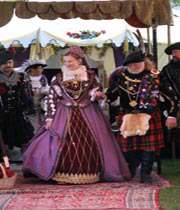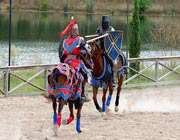Renaissance fair

A Renaissance fair', Renaissance faire, or Renaissance festival (colloquially renfair or renfest) is an outdoor weekend gathering, usually held in the USA, open to the public and generally commercial in nature, which emulates a historic period for the amusement of its guests. Some are permanent theme parks, others are short-term events in fairgrounds or other large public or private spaces. Renaissance fairs generally include an abundance of costumed entertainers, musical and theatrical acts, art and handicrafts for sale, and festival food. Some even offer camping, for those who wish to stay more than one day. Most Renaissance fairs are set during the reign of Queen Elizabeth I of England. Some are set earlier, during the reign of Henry VIII, or in other countries, such as France, and some include broader definitions of the Renaissance which include earlier periods, such as the Vikings, or later, such as 18th Century pirates. Renaissance fairs encourage visitors to enter into the spirit of things with costumes and audience participation. All tolerate, and many welcome, fantasy elements such as wizards and elves.
Chicago journalist Neil Steinberg said (of the Bristol Renaissance Faire), "If theme parks, with their pasteboard main streets, reek of a bland, safe, homogenized, whitebread America, the Renaissance Faire is at the other end of the social spectrum, a whiff of the occult, a flash of danger and a hint of the erotic. Here, they let you throw axes. Here are more beer and bosoms than you'll find in all of Disney World."
Characteristics
Most Renaissance fairs are arranged to represent an imagined village in England during the reign of Elizabeth I, as this period has been generally considered to correspond to the flowering of the English Renaissance.
In a modern Renaissance festival there are stages or performance areas set up for scheduled shows, such as plays in Shakespearean or commedia dell' arte tradition, as well as anachronistic audience participation comedy routines. Other performances include dancers, magicians, musicians, jugglers, and singers. Between the stages the streets ('lanes') are lined with stores ('shoppes') and stalls where independent vendors sell medieval and Renaissance themed handcrafts, clothing, books, and artworks. There are food and beverage vendors, as well as game and ride areas. Games include basic skills events such as archery or axe-throwing as well as Drench-a-Wench and Soak-a-Bloke, which allow a player with a good aim to hit a target and get a fair employee wet. Rides are typically unpowered -- various animal rides and human-powered swings are common. Live animal displays and falconry exhibitions are also commonplace. Larger Renaissance fairs will often include a joust as a main attraction.

In addition to the staged performances, a major attraction of Renaissance fairs is the crowds of professional actors who play all sorts of historical figures and roam the fair, interacting with visitors. Visitors are encouraged to wear costumes, once any weapons are suitably peace-bonded, contributing to the illusion of an actual Renaissance environment. Many of the fair vendors sell or rent costumes for all ages and types. The Renaissance fair subculture's word for these costumed guests is "playtrons", a portmanteau of the words "patron" and "player", and they add a second level of enjoyment to their experience by "getting into the act" as Renaissance Lords and ladies, peasants, pirates, belly dancers, or fantasy characters.
Most fairs have an end-of-the-day ritual, a parade or concert where all employees gather and bid farewell to the patrons.
For those who work at the fair, the last concert that a festival holds for the season is traditionally an emotional moment.
Renaissance fairs are staged around the United States at different times of the year. Fair vendors, participants and crew often work the "faire circuit", going from event to event as one fair ends and another begins. They often camp on-site or nearby and develop close bonds with their fellow performers.
Source: encyclopedia.thefreedictionary.com
Other Links:
Mamoncillo
Chaos (mythology)
Fact of the Day: Move to another country